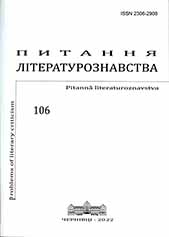Ідея спорідненої праці Григорія Сковороди у поезії модерністського об’єднання „Музагет”
Hryhoriy Skovoroda’s Idea of Related Work in the Poetry of the Modernist Association “Muzaget”
Author(s): Alyona TychininaSubject(s): Studies of Literature, Ukrainian Literature, Theory of Literature
Published by: Чернівецький національний університет імені Юрія Федьковича
Keywords: Hryhoriy Skovoroda; related work; “Muzaget”; conceptual dominant; Ukrainian modernism; modernist poetry;
Summary/Abstract: Hryhoriy Skovoroda’s idea of the immanent existence (1722–1794) about related work in Ukrainian modernists poetry, in particular representatives of the artistic group “Muzaget” (1919) is considered as the main methodological prism that conceptualize related work of Panna, outlined with the support of V. Gorsky, L. Ushkalov, and D. Chyzhevsky. The article describes the history of creation and specifics of Kyiv post-revolutionary group of symbolists “Muzaget” activities. The literary and artistic almanac with a similar name was analyzed, where each member of the collective presented his “related” art form: poetry, prose, criticism, painting and, at the same time, recorded the affinity of individual and social (national) principles. Based on the analysis of Mykhailo Zhuk, Dmytro Zahul, Volodymyr Kobylyansky, Klym Polishchuk, Oleksa Slisarenko, Mykola Tereshchenko, Pavlo Tychyna, Pavlo Fylypovych, and Volodymyr Yaroshenko poetry, conceptual dominants have been singled out, which in general realize the creative and collective affinity of “Muzaget poetry”. The symbolism of poetic images-archetypes is outlined: God, Christ, joy, star, flower, wind, path, poet’s soul, singing, music, and dream. The functioning of antitheses and parallelisms is emphasized: the flow of human life / the impermanence of nature, life / death, earth / hell / heaven, good / evil, day / night, asceticism / holiness / sinfulness, Christ / Satan, loneliness / crowd. The polyphonic musical imagery and musicality of the poem are analyzed by using tropes, phonetic and syntactic means. It is concluded that poetic innovation, truthful exhibition of creativity and individuality, accentuation of affinity between talent and character, productive interaction of friends in popular creative collectives in the conditions and under the influence of complex historical events and ideological dilemmas of the 20-30s of the 20th century, led some Musagetists to glorious recognition, and others to the tragic consequences of the Red Renaissance.
Journal: Питання літературознавства
- Issue Year: 2022
- Issue No: 106
- Page Range: 25-40
- Page Count: 16
- Language: Ukrainian

